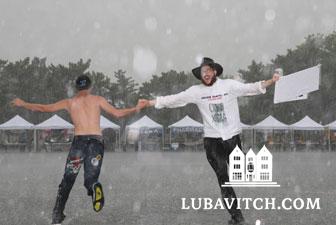(lubavitch.com) A torrent of rain sent the thousands attending Staten Island fest for Russian speakers scurrying for cover, but not Chabad rabbinical student Aharon Teleshevsky and Mark Tokar, 16.
Teleshevsky had helped Tokar wrap tefillin just moments before, a first for Tokar since his bar mitzvah. “I don’t do prayers, normally,” he said.
The two danced round and round as hundreds, huddling under tents set out to promote Russian-owned businesses, looked on.
"Rain is a blessing," said Rabbi David Okunov, program director of the Friends of Refugees of Eastern Europe (F.R.E.E.), the Chabad-Lubavitch Russian Program, who arranged the booth, by providing its volunteers, to reach out to the gathered Russian-Jews, and provide its translated Jewish living guides and publications in the Russian language.
A flood of blessings is needed to reach second and third generation progeny of Russian-Jewish immigrants. Of the estimated 700,000 Russian-Jewish immigrants in the U.S., about half live in New York.
Like the waves of immigrants before them, achieving the American dream means moving away from enclaves, like “Little Odessa” in the Brighton Beach section of Brooklyn, and off to the ‘burbs. Staten Island’s Russian population is thought to have grown from 15,000 in 2000 to somewhere between 50,000 and 70,000 today. About half are Jewish, according to Arkady Friedman, executive director of the Staten Island Community Center.
Americanization weakens cultural values. In an American Jewish Committee study, 41% of Russian Jewish immigrants polled in New York and Philadelphia said religion is not very important in their lives. Only 13% of Russian-Jewish Americans surveyed were synagogue members.
To reach Jewish people from the former Soviet Union who “don’t go to synagogue, won’t show up at Jewish cultural events, F.R.E.E. goes to them,” said Rabbi David Okunov.
Despite the weather, the booth was a success, organizers said. Some 100-plus men put on tefillin, a number of them for the first time in their lives. Others snapped up Jewish calendars with holiday dates and information printed in Russian and brochures promoting Jewish camps and preschools.
“I think we planted seeds of change today,” said Rabbi Okunov, “and what seed doesn’t like rain?”
{}

Be the first to write a comment.